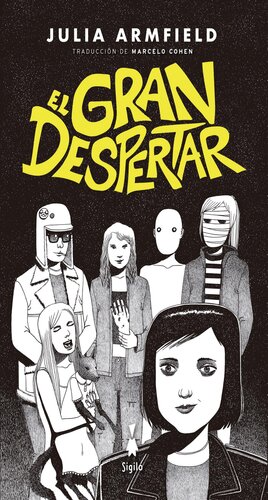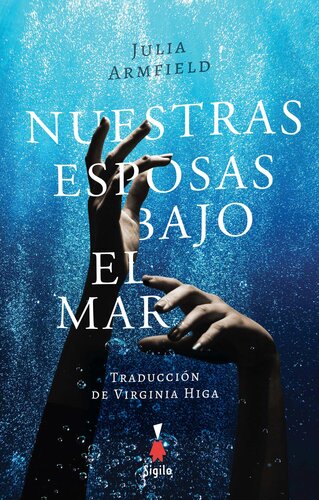oleebook.com
Private Rites de Julia Armfield
de Julia Armfield - Género: English
Sinopsis
Julia Armfield Publisher: HarperCollinsPublishers, Year: 2024 ISBN: 9780008608057,9780008608033
Descargar
Descargar Private Rites ePub GratisReseñas Varias sobre este libro
as long as julia armfield writes spooky gay literary horror, i will be readingdiverse lgbt-plus literary-fiction ...more76 s Léa385 3,143
It's no secret that this was my most anticipated book of the year and that I had expected it to be my favourite book ever... was it? no. were my expectations too high? I fear they were.
Julia Armfield is an incredible novelist and writes about grief, sisterhood, womanhood and melancholy in a way that resonates with me so deeply; that was no different with this book. So much of this was eloquent, heart wrenching and painfully relatable and I did underline SO MANY quotes as my favourites.
As a novel though, I felt so much of the apocalypse and end of the world state that the premise promised was missing. This book was incredibly quiet and subtle and whilst (from a narrative POV) I can understand why, it didn't make it any more of an enjoyable read. Dare I say I felt myself dragging my feet with it slightly. The last 50 pages for me were PERFECT and exactly what I wanted from this book ~ pretending that the rest was exactly that, it would've been all I wanted and more.
Saying this though, I can acknowledge that my expectations were VERY high and perhaps that impacted my reading experience slightly. I would still definitely recommend this, especially if you have already established that you Julia Armfield's writing!
(3.5 stars)adult-fiction arcs owned-read72 s4 comments Alwynne738 988
Julia Armfields lesbian Lear takes three queer sisters and places them in the middle of - what shes called - a mundane apocalypse. The sisters inhabit a drowned world, a place of unceasing rain which is slowly but inexorably wearing away its very foundations. Coastal regions have long ago disappeared, as have things cars and plane travel, most people live in cities since these are the only areas that retain some semblance of what was formally normality. Governments largely absent and when it does intervene incompetent. The wealthy inhabit custom-made houses in the higher-most regions while ordinary people are mainly confined to the upper reaches of crumbling high-rises. Its a similar scenario to the ones that writers Ballard found fascinating but, un Ballards work, there are few crescendos here, no violent rupture in the fabric of society. Instead, everythings dying off by degrees: some people have joined end-of-the-world cults with their obscure rituals; a few gather together to stage futile protests; others simply choose to vanish. But the mass of the population lives in a kind of stupefied denial, too fearful to look directly into the face of disaster. They cling to old routines, commuting to work, moaning about their bosses or colleagues or flatmates. They come together with one another but just as often drift apart.
Armfields vivid descriptions of rain seeping into every corner of daily life owes a partial debt to Arthur Machen, a favourite writer of Armfields, particularly the emphasis on its impact on mental as much as physical space. Amidst this simmering discontent, siblings Isla, Irene and half-sister Agnes are intent on maintaining a careful distance from one another. Although Isla and Irene are united in their contempt for younger, half-sister Agnes. Agnes meanwhile takes pleasure in small acts of subversion from mislabelling coffee cups in the café where she works to fucking random women in changing rooms. But the siblings awkward stalemates disrupted by their fathers death, a once-revered architect and an exacting, sadistic parent. His death brings the sisters back to the house he built for them, stirring up long-buried emotions and unsettling childhood memories, conjuring an atmosphere of growing, Jacksonian unease. Then weird things start to happen all of which appear to be converging on Agnes.
Armfields prose is impressively sinuous, her imagery striking, and her vision of a blighted future created by climate change all too convincing. But as a novel I found this unbalanced, difficult to place. On one level its an unusual blend of folk horror and speculative fiction but the bulk of the actual narratives caught up in detailing the fractured interactions between the three sisters and the aftermath of early trauma which wasnt always that appealing to me. There are some pleasing folkloric and mythic elements woven into Armfields story but theyre oddly underdeveloped, and I thought the final reveal was too heavily signposted perhaps because Im overly familiar with the classic horror movies Armfield loves and directly/indirectly references throughout. But perhaps thats the point? That conventional horror plots are less than scary when compared to the sheer scale of the environmental blight that lies ahead. Armfields story hints at alternative ways of tackling this looming disaster but her ultimate message seems less about concrete solutions than it is emotional responses: the importance of empathy, of making and sustaining meaningful connections.
Thanks to Netgalley and to publisher 4th Estate
Rating: 3 to 3.5contemporary-fiction netgalley-arc speculative-fiction61 s20 comments Roman Clodia2,632 3,614
Armfield is such an artful poet of wateriness. Set amidst a visceral imagining of climate catastrophe, this depicts with uncanny foresight what it might be to live in a city London when the waters rise: there are ramshackle jetties and water taxis trying to compensate for the fact that the outer edges of train lines are under water; outages of power are commonplace; alarms and sirens go off but no-one knows what they signify or what to do; and seals, pelicans and eels are moving into homes.
In the foreground are the archetypal three sisters - Isla, Irene and Agnes - all struggling in their own ways. The text references King Lear and Macbeth for necessary allusions to conflict and inheritance, a wayward and troubling father, absent mothers, from the former; and something more uncanny, weird and superstitious from the latter. For one of the outcomes of this end of days scenario is the rise of neo-religions and cults.
In some ways I found this narrative less definitive than Our Wives Under the Sea: the momentum is more blurred, less directional, more... watery and undefined. The denouement is, perhaps, a bit more dramatic with slightly less of a logical build-up. But those are small niggles.
What this succeeds in doing brilliantly is to delineate the nuanced relationships between the three sisters, the ways they simultaneously resent and cling to each other, the impact of parental troubles that shadow their growth and haunt their present. The febrile nature of their connections, and those they share with their wives and partners, is as brittle, enthreatened and undefined as the water in which this book is seeped. Their passivity, their hovering between safety, endurance and defiance is reflected more widely: Isla and Irene's cocooning is contrasted with Isla's ex-wife's determination to seek a better way to live - or, at least, see what's left of the world before it drowns. At the same time, the snarky, resentful, embittered yet, ultimately, strong sisterly bond feels tangible.
Atmospheric and controlled, this is a horrifying book delivered with a light touch. There have been other novelistic depictions of where our continued evasions of climate policies could lead but this feels one of the best imagined to me precisely because it's not overly dramatic: the slow slide into disaster feels oddly realistic as is the idea of a population essentially abandoned by a government: it's the small touches that make this work - chicory coffee (presumably because the beans can't be grown or imported), the way life continues with people getting to work as far as they can (with only an off-stage mention of an anti-work protest), houses that either collapse or those, for the wealthy, that can lift themselves above the saturated earth.
The interdependencies between the personal story of the sisters and the wider one of climate catastrophe play off each other in a lovely mutuality. It's a bit of a wrench - and a relief! - to look up from this book and realise that it's not raining, that the water isn't rising in the basement... and that it's sunny outside my window!
Immersive, thoughtful and lyrical.
Many thanks to 4th Estate for an ARC via NetGalleynetgalley51 s5 comments s.penkevich1,228 9,711 Want to read
Would make a New Years sacrifice at midnight for a copy of this book. This is the book energy I need going into 2024.51 s2 comments George19
Fucking get in! Julia Armfield is cemented as one of the best contemporary writers with this brilliant follow up to Salt Slow and Our Wives. More misery, more sex, more water - if somehow there are better books in 2024, itll be a mad year.33 s Melanie1,229 101k Want to read
? signed waterstones copies (available as of june 12th)
in inhuman demon sound that just left me
Autor del comentario:
=================================

